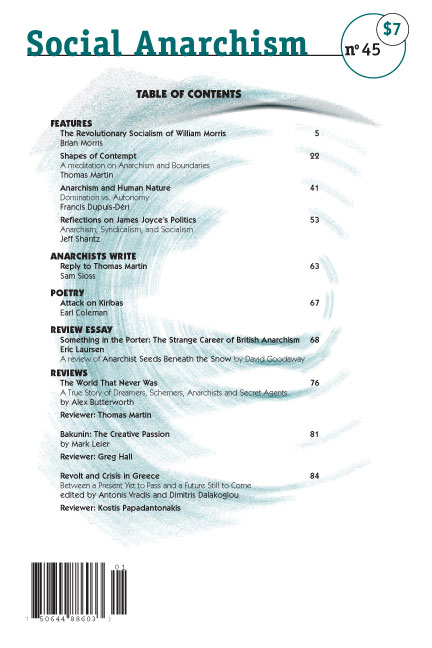Anarchism and Human Nature
Page: 3
Human Nature: Two Contradictory Forces
Although some anarchists certainly do have an optimistic view of human nature, anarchist thought cannot be reduced to this position. For other anarchists — the subject of what follows — human beings do not act in accordance with a single principle but are moved, rather, by two contradictory and opposite forces. Hence the most famous anarchists of the 19th century — Proudhon, Bakunin, and Kropotkin — “acknowledged human nature to be innately twofold, involving both an essentially egoistical potential and a sociable, or altruistic potential” (Suissa 2010: 25; see also Hartley 1995: 145). Closer to home, there are anarchists who consider that, “[i]f by human nature it is meant ‘what humans do,’ it is obvious that human nature is contradictory — love, hate, compassion and heartlessness, peace and violence, and so on.” (McKay and als. circa 2007: 1).
As for the 19th century anarchist Charlotte Wilson (2005: 128), she holds that human beings are traversed by two “social instincts,” that is, an instinct for domination and an egalitarian social instinct seeking for individual and collective “self-affirmation.” These two instincts, or principles, operate throughout human reasoning and emotions and are expressed in the form of individual and collective wills. Through domination we seek to impose our wishes on others. Through self-affirmation we strive to live according to our wishes on the basis of cooperation with those who act upon wishes compatible with or similar to our own. In both cases the central question is that of power. When we lean toward the principle of domination we strive to exert “power over” others, that is, to dominate them. When we lean toward the principle of self-affirmation we strive to exercise our “power to” propose or accomplish an individual or collective action.
The will to dominate is manifested in a community’s hierarchical organization and social relations, inasmuch as this entails positions of leadership endowed with coercive powers in the various spheres of human activity. In the words of Errico Malatesta (2004: 24-25), “the principle of authority” refers to the ability of certain individuals “to use social forces — that is, the physical, intellectual, and economic powers of all — to oblige everyone to do what they want.”
On the other hand, the wish for self-affirmation is manifested in the measures a community’s consciously applies in order to minimize the expression of the will to dominate in its structures and social relations. To this end, the group needs to have the power to resist individuals driven by the ambition to dominate. Anarchy is therefore expressed through the desire for self-affirmation, whenever a force contests and opposes the will to dominate and succeeds momentarily and more or less perfectly in creating a space of freedom, equality and solidarity.
Structuralist Thought
Since every individual harbours both of the humours discussed above, no one is good or bad. A person’s political position and social class as well as the society’s particular organization strongly affect the ratio between the two humours in that person’s life with respect to social relationships with members of the same or other classes, that is, with those who are above and below him or her in the social hierarchy. As underscored by Kropotkin (2002: 136), “We know that we ourselves are not without faults and that the best of us would soon be corrupted by the exercise of power.” Judith Suissa (2010: 28) furthermore notes that Kropotkin “acknowledg[es] human nature to be essentially contextualist, in the sense that they [i.e., anarchists] regard it as determined not by any human essence but by social and cultural context.” Consequently, “[a]narchists argue that hierarchical organisations bring out the worst in human nature” (McKay and als. circa 2007: 5).
The aim of anarchists is precisely to create and maintain social relationships and organizations that promote individual and collective autonomy, because human beings are greatly influenced by the social structure in which they find themselves. That structure, as well as the individual’s place and function within it determine to what extent the wish to dominate or to be autonomous is expressed or held in check. Here is how Kropotkin (2002: 135) responds to the detractors of anarchism who claim that anarchists have an idealistic and overly optimistic view of human nature: “Far from living in a world of visions and imagining men better than they are, we see them as they are; and that is why we affirm that the best of men is made essentially bad by the exercise of authority.” Kropotkin (2002: 135) goes on to assail these “utopians of authority,” who, blind to the paradox, state at the same time that authority is needed because human being are dangerous, without realizing that the most dangerous human being of all is the individual in a position of authority. Kropotkin (2002: 135) then mocks the “pretty government and paternal utopia” in which “[t]he employer would never be the tyrant of the worker; he would be the father! […] and never would a public prosecutor ask for the head of the accused for the unique pleasure of showing off his oratorical talent.” In an article published in Freedom in 1888 under the title “Are we good enough?” Kropotkin (1998: 81-82) explains that liberalism would be the perfect system if human beings were good, because the private ownership of capital would be no danger. The capitalist would hasten to share his profits with the workers, and the best-remunerated workers with those suffering from occasional causes. If men were provident they would not produce velvet and articles of luxury while food is wanted in cottages; they would not build palaces as long as there are slums.
Returning to the anarchists, Kropotkin concludes (2002: 136), “We have not two measures for the virtues of the governed and those of the governors; we know that we ourselves are not without faults and that the best of use would soon be corrupted by the exercise of power. We take men for what they are worth,—and that is why we hate the government of man by man.”
Anarchism is therefore compatible with a pessimistic conception of human nature: human beings are fundamentally corruptible and power corrupts. It is precisely because human beings are not good by nature that hierarchical structures cause moral and political disasters: abuse of power by people in positions of authority, non-accountability of individuals in subordinate positions who go so far as to imprison, torture, and kill others simply because they were ordered to do so by a hierarchical superior. Hence, in the words of Louise Michel (n.d. : 412), a French anarchist involved in the Paris Commune of 1871, “power makes people ferocious, selfish, and cruel, while servitude degrades them.” Of course, a few individuals in positions of authority could act for the good of the dominated out of a sense of solidarity and justice, but they would never represent any more than exceptions, because the problem is structural before being an individual or moral one. An individual in a position of authority within a hierarchical structure very easily becomes conceited, pretentious, arrogant, irresponsible, authoritarian and corrupt. The very fact of holding a position of power almost automatically skews an individual’s moral judgments about the world and himself. The problem is structural because it is related to the political function that people exercise, so they are tempted to abuse their authority. Adopting this structuralist approach, the late 19th century anarchist Élisée Reclus (2001: 30) asserts, “the grandees have more opportunities than others to exploit their situation,” and adds, “Once a man is invested with any sort of authority—priestly, military, administrative, or financial—he naturally tends to use, without restraint” (2001: 149). Hierarchies also have a corrupting influence on individuals in subordinate positions who lie and prevaricate because they fear those who dominate them or wish to please them so as to avoid punishment or gain some benefit. Moreover, (political) domination is intrinsically tied to the (economic) exploitation of another’s work, which produces goods and services for those who dominate.
The contemporary anarchist writer and activist John Clark (1978: 10) observes that anarchists have drawn the conclusion that political structures must be horizontal, egalitarian and consensual precisely because human beings are not naturally good and because they tend to be bad as soon as they manage to slip into a position of power. Under the influence of the structures in which they live and act, individuals have the potential to be just to the extent the structures are just.

